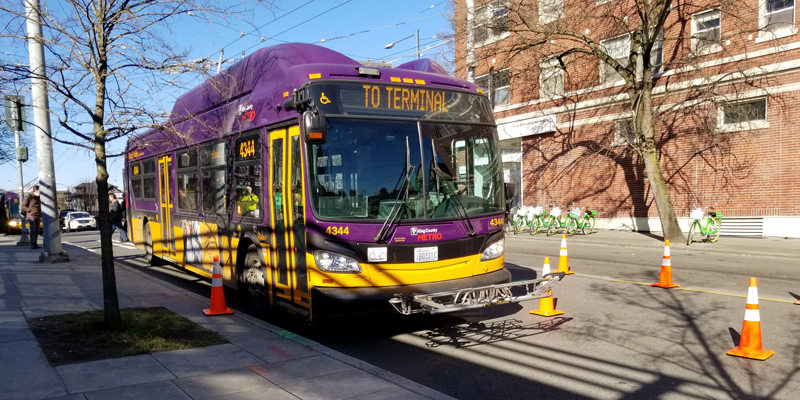Transit System Impacts
The Metro Transit System Impacts Group serves as the first point-of-contact at Metro Transit for public or private contractors, including city, state or other government agencies planning construction projects that may impact Metro transit or the Seattle Streetcar service or properties.
Guidelines for advanced notice
In accordance with the Metro Transit System Impacts Office, it is mandatory to provide construction notification. We particularly focus on construction activities that could affect Metro transit or Seattle Streetcar Operations, such as requests for trolley or streetcar overhead outages, special events with transit implications, or any situation affecting transit routes, bus stops, facilities, or properties.
Please reach out to us via email in advance of your event to gather insights on how your project might impact Transit Operations. This proactive step helps us guide you through the submission process for street use permits and special event permits, ensuring compliance with our requirements. Detailed information can be found in the forms and resources section.
| Event description | Minimum advanced notice |
|---|---|
| Street closures or transit detours to accommodate construction. | 10 business days |
| Short term bus stop moves that impacts our facilities or might require a shelter move. | 5 business days |
| Long term Bus stop moves that impacts our facilities or might require a shelter move. | 30 business days |
| Phase changes and re-starts of existing projects. | 10 business days |
| Deactivation of trolley bus overhead (Saturdays and Sundays only) | 15 business days |
| Deactivation of streetcar overhead or streetcar track ROW access (during non-revenue hours) | 15 business days |
| Trolley or Streetcar wire modification requests (subject to design approval and infrastructure inspection and acceptance) | 20 business days |
| Motorization of electric trolley buses without deactivation of any overhead lines (Saturdays and Sundays only) | 5 business days |
How to request trolley overhead deactivation
-
Submit completed TOH deactivation form
The contractor submits completed TOH deactivation form to System Impacts via email (trolley.impacts@kingcounty.gov).
-
Receive invoice for deactivation fee (if not exempt)
If the contractor is not exempt, King County Accounts Receivable (AR) sends an invoice for the deactivation fee to the contractor.
-
Pay the deactivation fee
The contractor submits the cash or check payment in person to King County Finance & Business Operations Division.
-
Request processed
Trolley Impacts processes the request and sends the approved form to the contractor.
-
Receive invoice for deactivation charges
King County Power & Facilities sends an invoice to the contractor for the deactivation charges.
How to cancel a request
-
Notification of Trolley Impacts
The contractor notifies the Trolley Impacts of cancellation.
-
Power Distribution and Accounts Receivable are notified
Trolley Impacts notifies Power Distribution and AR of the cancellation. If the notification is made prior to the deadline, AR will issue a 50% refund of the TOH deactivation fee. Cancellations received after the deadline result in forfeiture of the fee.
Deadlines
Two weeks prior to weekend of deactivation
- Monday 9 am: Cancellation of TOH deactivation requests for 100% refund.
The week of the deactivation
- Monday 10 am: Fee payment submitted to AR.
- Thursday 4 pm: Cancellation of TOH deactivation requests for 50% refund.
Billing for Trolley Deactivation Services
Billing for trolley deactivation services are executed as 2 separate invoices:
- $1,000 fee payment - billed in advance of the deactivation services
Effective April 16, 2012, King County Ordinance 16943 requires prepayment of a $1,000 fee before trolley overhead (TOH) deactivation requests can be fulfilled. - Crew costs - billed after the deactivation work is completed
Crew costs are for the deactivation and restoration of the trolley power lines. These costs consist of labor, equipment, materials, and meals (per labor contract).
Payment options
Payments are processed the fastest online and subject to a processing fee.
- Pay online: Pay Invoices
- By mail:
King County Finance
201 S Jackson, Suite 710
Seattle, WA 98104 - In person:
King County Customer Service counter
201 S Jackson, 2nd floor.
Contact information
Comfort Stations Impacts
Phone: 206-571-6952
Email: station.comfort@kingcounty.gov
Fax: 206-684-2686
 Translate
Translate
